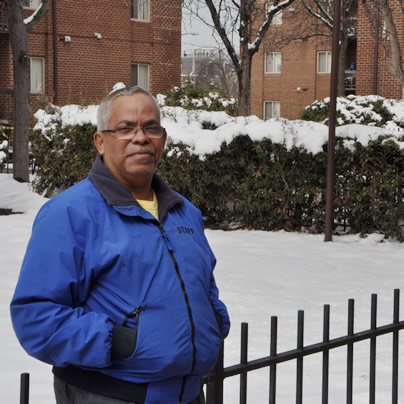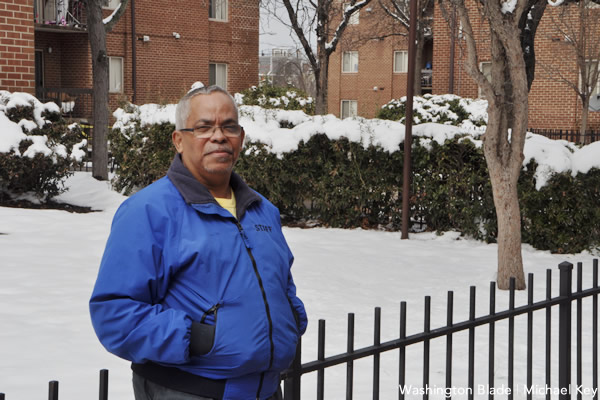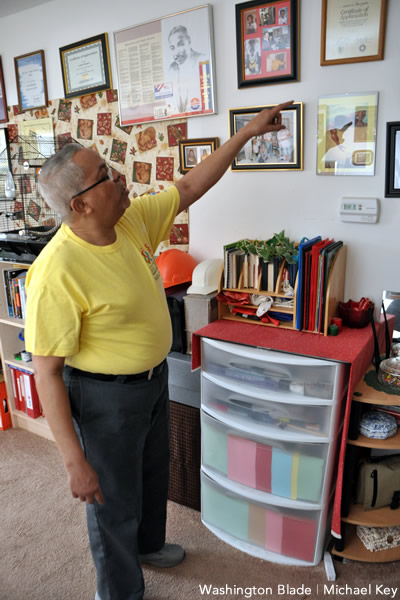National
SPECIAL REPORT: ‘You can’t let adversity get you down’
Many LGBT elders struggling with economic insecurity


Cedric Burgess says he lives ‘check to check’ while relying on government assistance to pay bills. Despite his struggles, he works to give back to the LGBT community. (Washington Blade photo by Michael Key)
Editor’s note: This is the first of a two-part look at how poverty affects elder members of the LGBT community and part of a yearlong Blade focus on poverty. To share your ideas or personal story, visit us on Facebook or email [email protected]. Click here to read previous installments.
“I did my dirt,” said Cedric Burgess, a black gay man and longtime Washington, D.C. resident who grew up in the District. “I was young and full of fun!”
Today, Burgess, 61, is a recovering alcoholic who suffers from depression. He’s been HIV positive for more than 30 years. “I live from check to check,” said Burgess, who receives Social Security disability benefits.
Before undergoing a hip replacement four years ago, he struggled to walk up to his second-story apartment.
“It is a wonder to be able to walk without my cane,” Burgess said. “No matter what pain pills I took, I couldn’t get to sleep. You don’t realize how much pain you’re in. You adapt. I couldn’t cross my legs. Steps weren’t an option.”
At 19, Burgess came out to his family.
“I was accepted by my family. I was taken in,” he said, “that was a blessing!”
For some years, he worked in a series of clerical jobs. In 1982, Burgess, then living and working as an administrative assistant in Atlanta, was hit by a drunk driver. The accident left him with back pain, nerve damage and sciatica. For two years, unable to work, he did physical therapy. In 1984, Burgess returned to work. After returning to D.C., he went back to doing clerical work.
During the AIDS epidemic, his family confronted Burgess.
“They said ‘you gotta get tested,’” he said. “In 1991, after I found out I was positive, I took a two-week vacation. I got HIV through a blood transfusion I received when I had my accident. They weren’t screening transfusions for HIV then.”
In 2006, his back pain became so severe that Burgess left the workforce. He said he retired from the Green Door, a D.C. organization that helps people with mental challenges, where he worked as a program assistant.
“You can’t let adversity get you down, you have to have a positive attitude,” Burgess added. Fortunately, he said, social safety net programs help him to make ends meet. In addition to his monthly disability check, Burgess receives food stamps. His health care is covered by Medicare and Medicaid.
“I receive energy assistance from Pepco and two-thirds of my rent, with funding from the Ryan White Act, is subsidized by the Washington, D.C. Housing Coalition,” Burgess said.
These programs are a lifeline for him. “Without the rental assistance and the Medicare and Medicaid, I wouldn’t be able to afford housing and health care,” Burgess said. “I couldn’t pay for my HIV medications and I couldn’t have had my hip replacement.”

Cedric Burgess says many elders don’t know their legal rights when it comes to housing and other issues. (Washington Blade photo by Michael Key)
Despite living with economic hardship, Burgess leads an active and full life. Committed to helping others, he has volunteered for groups serving everyone from homeless youth to elders. “I’m a goodwill ambassador for the DC Center for the LGBT Community and for AARP,” Burgess said. “I help seniors learn about their rights in housing and in nursing homes. Many seniors don’t know their rights.”
“I believe in God’s healing,” he went on, “I go to church. I have no prejudice against any other religion. I’m a spiritually free person.”
Burgess’s situation is far from unique. Many LGBT older adults (aging Baby Boomers over 50) live with economic insecurity.
“Media and marketing stereotypes view the LGBT community as an affluent niche group filled with couples with double incomes,” said Matthew J. Corso, chief communications officer and board member of the DC Center for the LGBT Community. “The poverty rate among LGBT older adults is much higher than people would think from the marketing view. Older adults can often feel isolated.”
The DC Center’s Coffee and Conversation is a safe space where older adults can connect with others in the community and discuss issues related to living with economic insecurity, Corso said.
People rarely look at economic insecurity and aging, said Robert Espinoza, senior director of public policy and communications for Services and Advocacy for GLBT Elders (SAGE), “People studying poverty don’t look often enough at poverty among LGBT and older people. On the other side, people studying LGBT issues aren’t looking often enough at aging and poverty.”
But studies that have been done show that poverty is high among elders and even higher among LGBT older adults, Espinoza said. Among the findings:
• One in six Americans aged 65 and older lives in poverty, according to a 2013 Congressional Research Service report.
• The poverty rate is as high or higher among lesbian, gay and bisexual people than for heterosexual people, and lesbian couples, 65 and older, are twice as likely to be poor as straight married couples, according to a 2009 Williams Institute Report.
• There are an estimated 1.5 million gay, lesbian and bisexual elders in the United States today. The number is expected to increase to nearly 3 million by 2030, according to “Improving the Lives of LGBT Older Adults” from SAGE, the Movement Advancement Program (MAP) and Center for American Progress.
• Because historically LGBT people have not been able to marry, many LGBT older adults face the economic insecurity and health issues that come with aging without the support from families that heterosexual older adults often receive. LGBT elders are twice as likely to be single and three to four times more likely to be without children as their straight peers, according to the MAP report.
• Transgender adults encounter profound discrimination, according to a SAGE and National Center for Transgender Equality 2012 report. They experience “striking disparities in … health care access … employment and more,” the report states, “with a growing older transgender population, there is an urgent need to understand the challenges that can threaten financial security, health and overall well-being.”
Several factors contribute to poverty among LGBT elders. “In the past, many faced employment discrimination because they were LGBT. LGBT people of color and lesbians faced even more severe discrimination,” Espinoza said. “Too many LGBT older adults have little, if any, retirement savings.”
• LGBT older adults face health disparities and 47 percent of LGBT people over 50 have a disability, said Imani Woody, Ph.D., chair of SAGE Metro D.C. “More than one in 10 LGBT people aged 50-plus have been denied health care or provided with inferior health care,” she said. “This can lead to economic insecurity, which can translate to poverty. If you don’t have access to health care, what do you have?”
Even older LGBT adults with moderate incomes, who wouldn’t think of themselves as facing poverty, can become impoverished if they become disabled or need long-term care, Espinoza said. “If you only have savings of, say, $60,000, it will go quickly.”
Lack of affordable housing and housing discrimination are key reasons why many LGBT older adults live in or near poverty. Same-sex older couples encounter discrimination when seeking housing in senior living facilities, according to a report, “Opening Doors: An Investigation of Barriers to Senior Housing for Same-Sex couples,” released last month by the Equal Rights Center, a civil rights organization in partnership with SAGE.
“We saw a number of adverse treatments with a high economic impact,” said Don Kahl, executive director, Equal Rights Center. “Sometimes they were charged for having an ‘extra person.’ At other times, they were told they’d have to take a more expensive two-bedroom apartment when they wanted a one-bedroom,” he said, “In other cases, they were treated in such a manner, that they wouldn’t accept the housing even if it was offered.”
It’s a misperception to think that as people age, they accumulate wealth and live out their days in comfort, said Peter Johnson, director of public relations for the Center on Halsted in Chicago. “It’s even more true for LGBT older adults. Before we began to experience marriage equality, LGBT seniors might have shared finances unevenly with their partners,” he said. “Without marriage, if one partner dies or the relationship ends, a huge financial burden is placed on the remaining partner.”
The Center on Halsted is working with the Heartland Alliance to provide LGBT older adults with affordable housing in the LakeView neighborhood of Chicago. “While not exclusively LGBT it will be LGBT focused and friendly,” Johnson said. “It will be 79 units of subsidized housing with the rent being no more than one-third of residents’ income.”
LGBT elders live in or near poverty nationwide — from rural to metropolitan areas, Johnson said. “We are fortunate to have Heartland [Alliance] dealing with us on these issues.”
Next week: Meet elder members of the LGBT community coping with unemployment and economic insecurity.
U.S. Supreme Court
Supreme Court to consider bans on trans athletes in school sports
27 states have passed laws limiting participation in athletics programs

The U.S. Supreme Court on Thursday agreed to hear two cases involving transgender youth challenging bans prohibiting them from participating in school sports.
In Little v. Hecox, plaintiffs represented by the ACLU, Legal Voice, and the law firm Cooley are challenging Idaho’s 2020 ban, which requires sex testing to adjudicate questions of an athlete’s eligibility.
The 9th U.S. Circuit Court of Appeals described the process in a 2023 decision halting the policy’s enforcement pending an outcome in the litigation. The “sex dispute verification process, whereby any individual can ‘dispute’ the sex of any female student athlete in the state of Idaho,” the court wrote, would “require her to undergo intrusive medical procedures to verify her sex, including gynecological exams.”
In West Virginia v. B.P.J., Lambda Legal, the ACLU, the ACLU of West Virginia, and Cooley are representing a trans middle school student challenging the Mountain State’s 2021 ban on trans athletes.
The plaintiff was participating in cross country when the law was passed, taking puberty blockers that would have significantly reduced the chances that she could have a physiological advantage over cisgender peers.
“Like any other educational program, school athletic programs should be accessible for everyone regardless of their sex or transgender status,” said Joshua Block, senior counsel for the ACLU’s LGBTQ and HIV Project. “Trans kids play sports for the same reasons their peers do — to learn perseverance, dedication, teamwork, and to simply have fun with their friends,” Block said.
He added, “Categorically excluding kids from school sports just because they are transgender will only make our schools less safe and more hurtful places for all youth. We believe the lower courts were right to block these discriminatory laws, and we will continue to defend the freedom of all kids to play.”
“Our client just wants to play sports with her friends and peers,” said Lambda Legal Senior Counsel Tara Borelli. “Everyone understands the value of participating in team athletics, for fitness, leadership, socialization, and myriad other benefits.”
Borelli continued, “The U.S. Court of Appeals for the Fourth Circuit last April issued a thoughtful and thorough ruling allowing B.P.J. to continue participating in track events. That well-reasoned decision should stand the test of time, and we stand ready to defend it.”
Shortly after taking control of both legislative chambers, Republican members of Congress tried — unsuccessfully — to pass a national ban like those now enforced in 27 states since 2020.
Federal Government
UPenn erases Lia Thomas’s records as part of settlement with White House
University agreed to ban trans women from women’s sports teams

In a settlement with the Trump-Vance administration announced on Tuesday, the University of Pennsylvania will ban transgender athletes from competing and erase swimming records set by transgender former student Lia Thomas.
The U.S. Department of Education’s Office for Civil Rights found the university in violation of Title IX, the federal rights law barring sex based discrimination in educational institutions, by “permitting males to compete in women’s intercollegiate athletics and to occupy women-only intimate facilities.”
The statement issued by University of Pennsylvania President J. Larry Jameson highlighted how the law’s interpretation was changed substantially under President Donald Trump’s second term.
“The Department of Education OCR investigated the participation of one transgender athlete on the women’s swimming team three years ago, during the 2021-2022 swim season,” he wrote. “At that time, Penn was in compliance with NCAA eligibility rules and Title IX as then interpreted.”
Jameson continued, “Penn has always followed — and continues to follow — Title IX and the applicable policy of the NCAA regarding transgender athletes. NCAA eligibility rules changed in February 2025 with Executive Orders 14168 and 14201 and Penn will continue to adhere to these new rules.”
Writing that “we acknowledge that some student-athletes were disadvantaged by these rules” in place while Thomas was allowed to compete, the university president added, “We recognize this and will apologize to those who experienced a competitive disadvantage or experienced anxiety because of the policies in effect at the time.”
“Today’s resolution agreement with UPenn is yet another example of the Trump effect in action,” Education Secretary Linda McMahon said in a statement. “Thanks to the leadership of President Trump, UPenn has agreed both to apologize for its past Title IX violations and to ensure that women’s sports are protected at the university for future generations of female athletes.”
Under former President Joe Biden, the department’s Office of Civil Rights sought to protect against anti-LGBTQ discrimination in education, bringing investigations and enforcement actions in cases where school officials might, for example, require trans students to use restrooms and facilities consistent with their birth sex or fail to respond to peer harassment over their gender identity.
Much of the legal reasoning behind the Biden-Harris administration’s positions extended from the 2020 U.S. Supreme Court case Bostock v. Clayton County, which found that sex-based discrimination includes that which is based on sexual orientation or gender identity under Title VII rules covering employment practices.
The Trump-Vance administration last week put the state of California on notice that its trans athlete policies were, or once were, in violation of Title IX, which comes amid the ongoing battle with Maine over the same issue.
New York
Two teens shot steps from Stonewall Inn after NYC Pride parade
One of the victims remains in critical condition

On Sunday night, following the annual NYC Pride March, two girls were shot in Sheridan Square, feet away from the historic Stonewall Inn.
According to an NYPD report, the two girls, aged 16 and 17, were shot around 10:15 p.m. as Pride festivities began to wind down. The 16-year-old was struck in the head and, according to police sources, is said to be in critical condition, while the 17-year-old was said to be in stable condition.
The Washington Blade confirmed with the NYPD the details from the police reports and learned no arrests had been made as of noon Monday.
The shooting took place in the Greenwich Village neighborhood of Manhattan, mere feet away from the most famous gay bar in the city — if not the world — the Stonewall Inn. Earlier that day, hundreds of thousands of people marched down Christopher Street to celebrate 55 years of LGBTQ people standing up for their rights.
In June 1969, after police raided the Stonewall Inn, members of the LGBTQ community pushed back, sparking what became known as the Stonewall riots. Over the course of two days, LGBTQ New Yorkers protested the discriminatory policing of queer spaces across the city and mobilized to speak out — and throw bottles if need be — at officers attempting to suppress their existence.
The following year, LGBTQ people returned to the Stonewall Inn and marched through the same streets where queer New Yorkers had been arrested, marking the first “Gay Pride March” in history and declaring that LGBTQ people were not going anywhere.
New York State Assemblywoman Deborah Glick, whose district includes Greenwich Village, took to social media to comment on the shooting.
“After decades of peaceful Pride celebrations — this year gun fire and two people shot near the Stonewall Inn is a reminder that gun violence is everywhere,” the lesbian lawmaker said on X. “Guns are a problem despite the NRA BS.”
-

 U.S. Supreme Court2 days ago
U.S. Supreme Court2 days agoSupreme Court to consider bans on trans athletes in school sports
-

 Out & About2 days ago
Out & About2 days agoCelebrate the Fourth of July the gay way!
-

 Virginia2 days ago
Virginia2 days agoVa. court allows conversion therapy despite law banning it
-

 Maryland5 days ago
Maryland5 days agoLGBTQ suicide prevention hotline option is going away. Here’s where else to go in Md.












